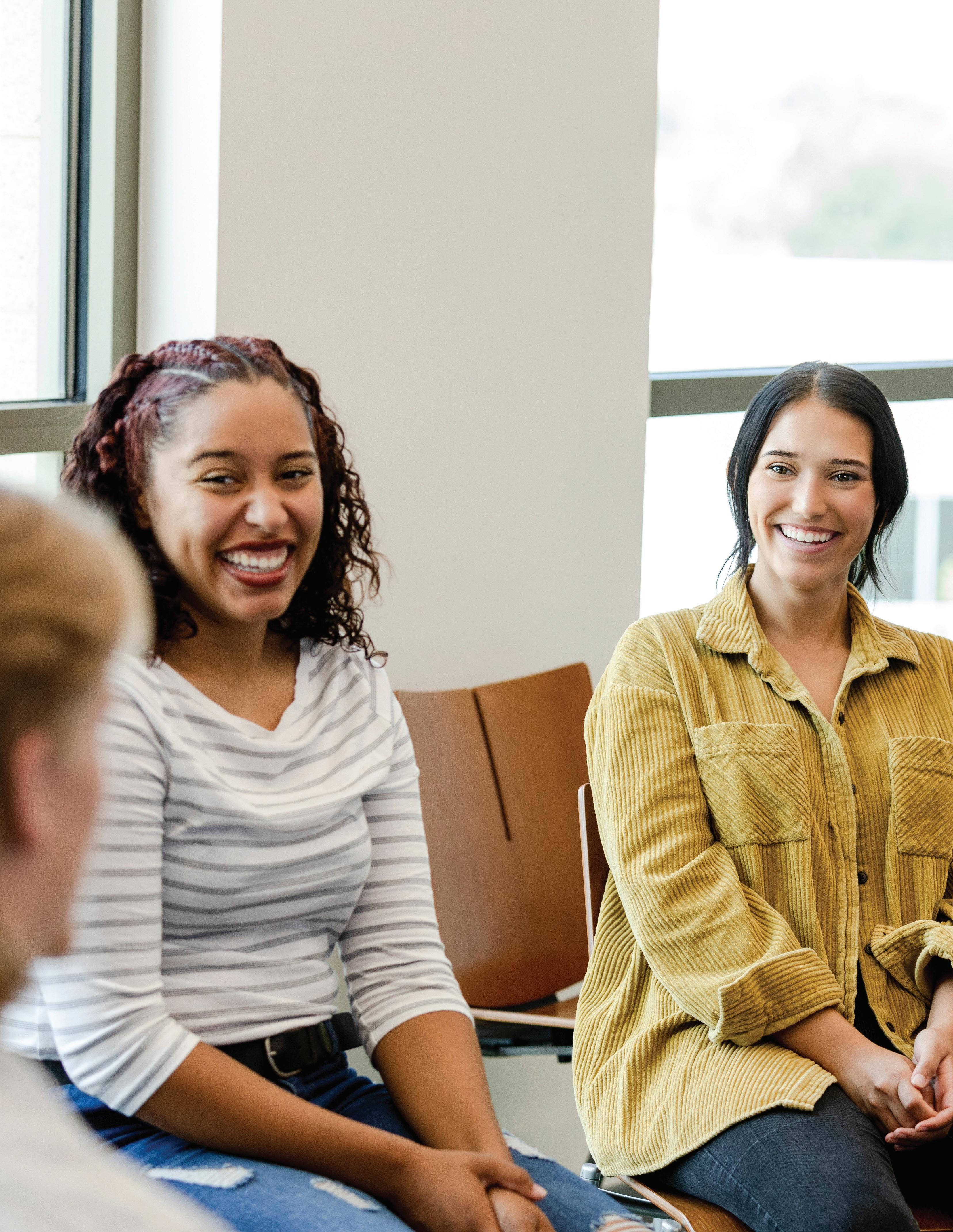
Vibrant Communities A Publication of Comprehensive Healthcare 4 / What Are CCBHCs? 7 / Help Has Arrived: Youth Mobile Outreach Team 9 / 5 FAQs About Group Therapy FALL 2023 Creative Solutions in Behavioral Healthcare
Meet Rich Simpson, Supervisor, Walla
Child and Family Outpatient, Unit 2
For nearly a quarter-century, Rich Simpson has been a mainstay on the team that provides therapy and other outpatient services to youth and families in Walla Walla. He oversees the child and family unit that offers therapy, medication management and case management for clients ages five and older – including onsite and school-based programs in Walla Walla County schools.
Rich says he loves community mental health and the services that Comprehensive Healthcare provides. “What I really appreciate about working here is that if you have an idea – they are supportive and encourage you to try new things. There is a good spirit of camaraderie, support and accessibility here.”
Rich reflected on a creative idea he suggested years ago – that his team expand its services to include adults, since caseloads would significantly decrease during school breaks when there are fewer referrals from educators. Now, it’s common practice across Comprehensive Healthcare, and it helps by training more therapists on evidence-based practices, increases job retention and
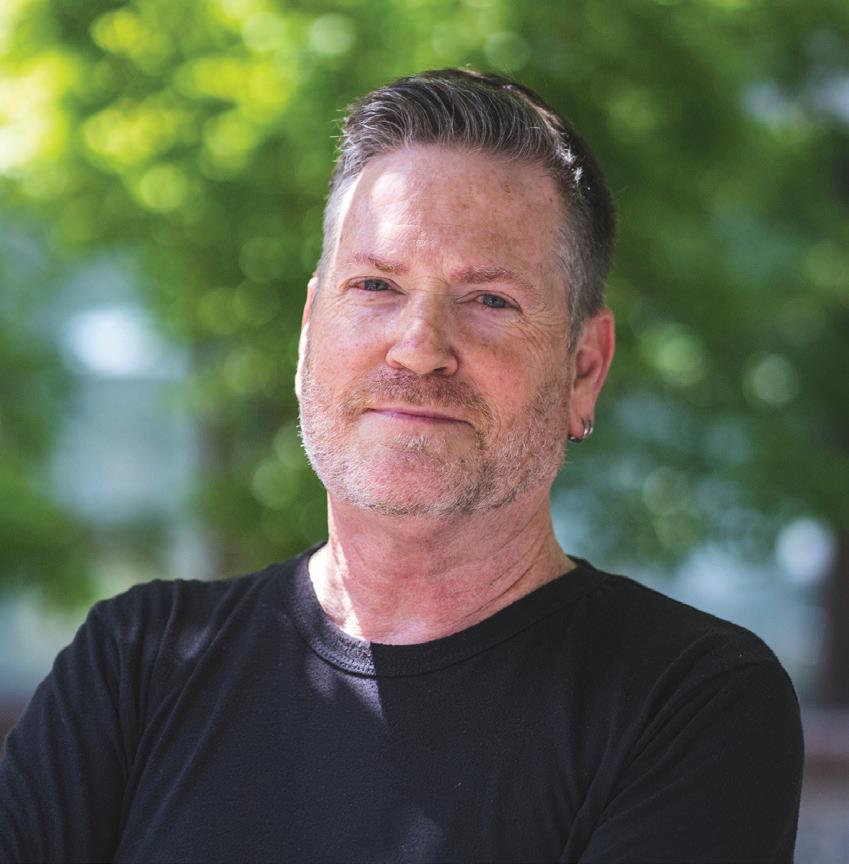
Inside this issue 2 3 4 5 6 8 11 9 7 10
Walla
helps with productivity.
are CCBHCs Meet Rich Simpson, Supervisor, Walla Walla Child and Family Outpatient, Unit 2 Creative Solutions in Behavioral Health Help Our Communities Additional Support for Youth and Families is on the Way 5 FAQs About Group Therapy Comprehensive Healthcare: Now Hiring Help Has Arrived: Youth Mobile Outreach Team Embracing the Convenience of Telehealth Appointments See Us in the Community September is Suicide Prevention Awareness Month STAFF HIGHLIGHT CEO LETTER LEARN MORE Special Youth Services Section Vibrant Communities 2
STAFF HIGHLIGHT What
If you are experienceing a crisis call 1 (800) 572-8122
At Comprehensive Healthcare, we focus on being observant, flexible, and creative so that we can evolve and innovate to meet the constantly changing needs of our clients and communities. Even with the increasing behavioral health challenges in our communities and a long-standing workforce shortage, we continue to implement services that are effective, timely and make efficient use of our resources. That’s good news for our clients, and a celebration for Vibrant Communities.
Creative Solutions in Behavioral Health Help Our Communities
Inside this issue you’ll find more about programs designed to help our communities thrive, such as the youth mobile outreach team (page 7), telehealth appointments (page 8), and group therapy (page 9). And if you’re looking to work for an organization that has community at its heart, you can see some of our job opportunities available (page 10) and community events (page 11) we’ve attended as a Comprehensive Healthcare team. We hope you’ll join us!
Additionally, we recently received two Substance Abuse and Mental Health Services Administration (SAMHSA) grants: the Certified Community Behavioral Health Clinic (CCBHC) Planning, Development and Implementation
(PDI) grant and the Youth and Family TREE grant (page 6). With a combined $1.5 million in funding dedicated to Walla Walla County, we’re expanding several programs to help overcome barriers to treatment, including same-day appointments, services for youth and families, and more. We continue to secure impactful funding that helps us bring our innovative programs to life.
We hope you’ll enjoy reading more about the ways we’re implementing creative solutions in behavioral healthcare to help build resiliency in the communities we serve. If you see a behavioral health need in your community that isn’t being met, please reach out to us and together we can develop creative solutions.
 Jodi Daly, Ph.D. President and CEO, Comprehensive Healthcare Member of Fourfront Contributor
Jodi Daly, Ph.D. President and CEO, Comprehensive Healthcare Member of Fourfront Contributor
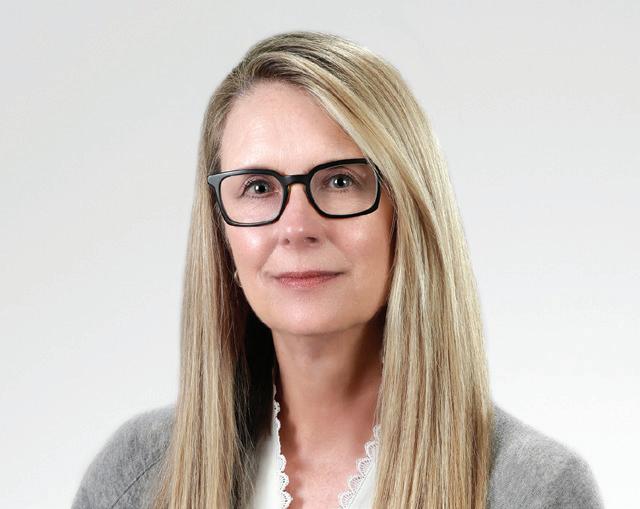
We continue to secure impactful funding that helps us bring our innovative programs to life. ” “
FALL 2023 3
What are CCBHCs?
You may have heard the national conversation about Certified Community Behavioral Health Clinics (CCBHCs), which is a nationally proven model for sustainably funding mental health and substance use treatment. CCBHCs serve anyone who walks through the door, regardless of their diagnosis and insurance status. Based on demonstrated success in multiple states, the CCBHC model would enable providers in Washington state to focus on whole-person care, allowing us to better navigate the current workforce crisis and ensure folks can access behavioral health care when and where they need it. In the process, the model also helps to reduce reliance on other community resources, such as hospitals, jails, and schools, in responding to behavioral health needs. On a national level, in July President Joe Biden gathered with legislators and behavioral health advocates to highlight the need for more changes to expand access to comprehensive mental health and substance use care services through new proposed rules to improve compliance with the Mental Health Parity and Addiction Equity Act. You can learn more in this article from our advocacy coalition, Fourfront Contributor, “National Conversations Surrounding Mental Health.”
Right here at Comprehensive Healthcare, we’re doing our part to advocate for and implement the CCBHC model because it helps us provide optimal care for our clients. We’ve received significant grant funding to help us make this happen in Walla Walla. Jodi Daly, CEO of Comprehensive Healthcare, recently wrote an op-ed that was published in the Walla Walla Union Bulletin sharing more about the ways that we are improving services for our clients through federal funding for CCBHC planning and implementation.
As an integrated and sustainably financed model of care, CCBHCs:
How Do CCBHCs Work?
• Ensure access to behavioral health care, regardless of insurance.
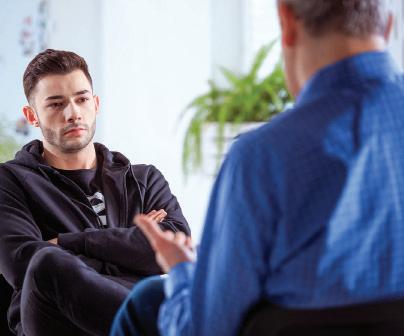
• Meet stringent criteria regarding timely access, quality reporting, staffing and coordination with social services, criminal justice and education systems.
• Receive flexible funding to support the real costs of expanding services to fully meet the need for care in their communities.
We Now Have Same Day Access Appointments!
Comprehensive Healthcare now has Same Day Access appointments available at all our locations. With Same Day Access appointments, clients can walk into a Comprehensive Healthcare location Monday through Friday between 7:30 a.m. and 3 p.m. for an immediate intake assessment, which helps clients receive timely services on the same day they express interest.
By offering more immediate access to care, Comprehensive Healthcare ensures clients can seek and receive help when they feel ready and motivated, which leads to increased well-being and better outcomes for clients.
Vibrant Communities 4
WARNING SIGNS
Recognizing the warning signs of suicide is of paramount importance in our collective effort to prevent it. If you sense that someone is at risk, be vigilant for these indicators that may manifest in their behavior or conversations:
• Talking about being a burden
• Being isolated
• Increased anxiety
• Talking about feeling trapped or in unbearable pain
• Increased substance use
• Looking for a way to access lethal means
• Increased anger or rage
• Extreme mood swings
• Expressing hopelessness
• Sleeping too little or too much
• Talking or posting about wanting to die
• Making plans for suicide
September is Suicide Prevention Awareness Month
Suicide is a complex issue that deserves our attention and understanding. Sadly, it is one of the most common causes of death in our society, with 48,183 people losing their lives in the United States alone in 2021. However, we must remember that suicide is preventable, and with the right support and empathy, we can make a difference.
Preventing suicide isn’t a single person or entity’s responsibility. It requires efforts and strategies from individuals, families, and communities. Something everyone can do today to prevent suicide is to learn the warning signs and symptoms of suicide, who might be more at risk than others, and what resources are available to those who may be struggling.
Offering Support and Seeking Help
When it comes to suicide, early detection and intervention are paramount. Recovery is possible with the right support system in place. Treatment typically involves a combination of counseling, medication, and lifestyle adjustments, such as maintaining a nutritious diet, engaging in regular exercise, and prioritizing adequate sleep.
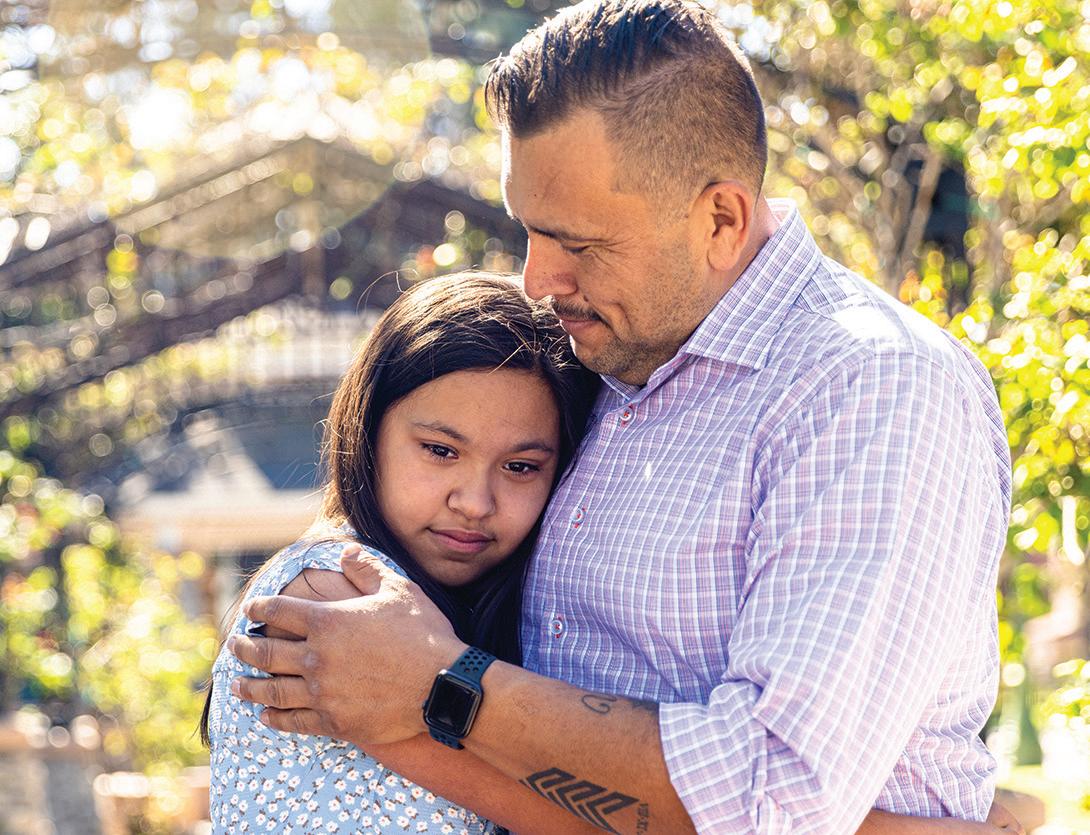
If you recognize these signs in yourself or someone you know, it is essential to seek help promptly. Contact your primary care provider, Comprehensive Healthcare, or call the crisis lines available. Remember, you are not alone; talking to someone you trust can make a significant difference.
In cases of immediate danger or suicidal thoughts, do not hesitate to call 911 or the National Suicide Prevention Lifeline at (800) 273-TALK (800) 273-8255).
!! FALL 2023 5
Additional Support for Youth and Families is on the Way
Comprehensive Healthcare was just awarded the Substance Abuse and Mental Health Services Administration (SAMHSA) Youth and Family TREE Grant: Enhancement and Expansion of Treatment and Recovery Services for Adolescents, Transitional Aged Youth, and Their Families, which will significantly impact our services in the Walla Walla and Benton Franklin communities.
With the federal grant providing more than $2 million over five years, Comprehensive Healthcare will enhance and expand comprehensive treatment, early intervention, and recovery support services for adolescents (ages 12-18) and transitional-aged youth (ages 16-25) with substance use disorders (SUD) and/or co-occurring substance use and mental disorders (COD), and their families/primary caregivers.
“What this means for youth and families is life-changing because now our services will wrap around the whole family unit, instead of just one identified client,” according to Natalie McGillen, Comprehensive Healthcare senior director. “We find that oftentimes our younger clients don’t just need our services for themselves, but instead they are impacted by things going on at home. So now we can support the whole family unit with services that set them up for success.”
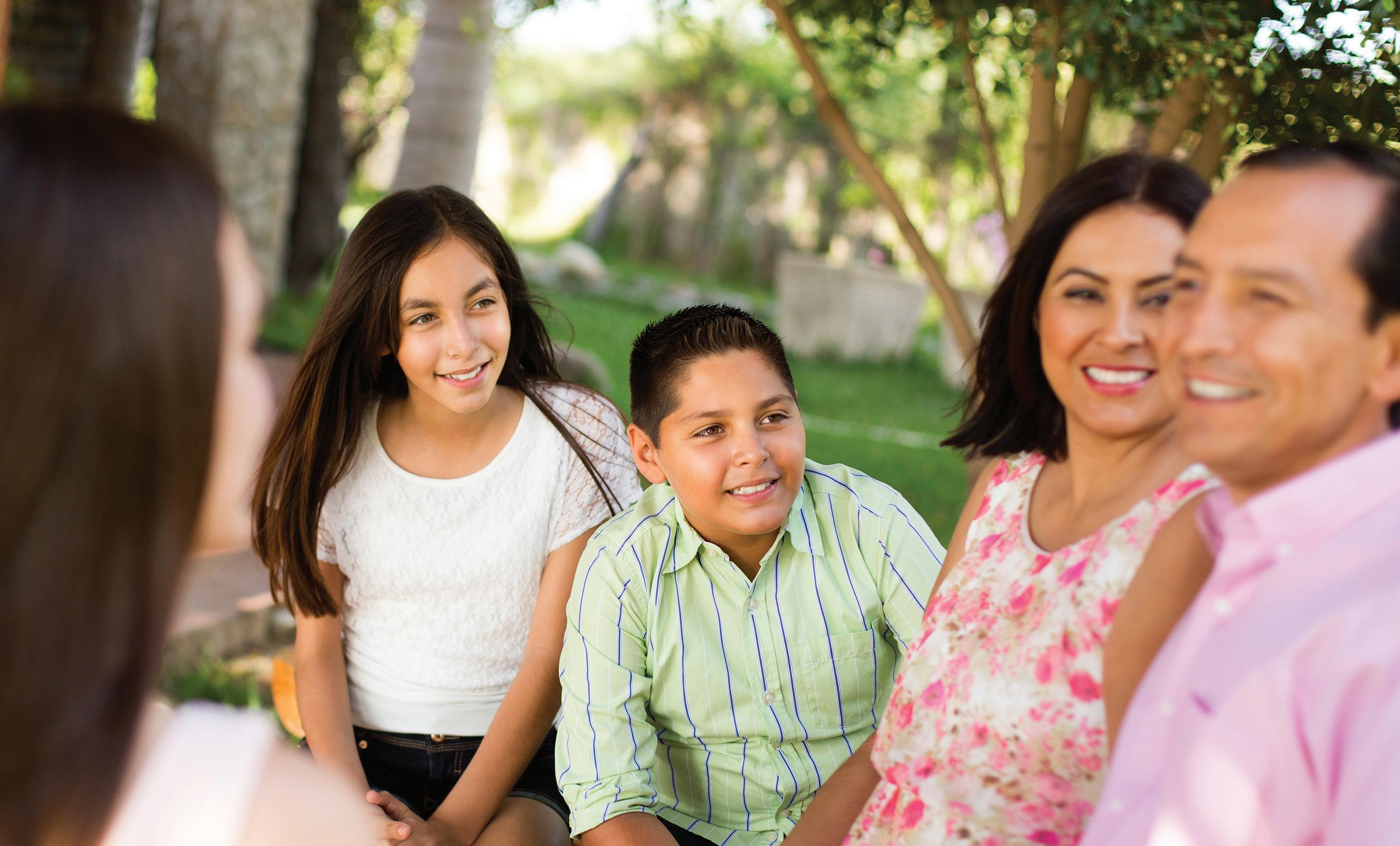
For example, the grant funding offers supported employment and career counseling for transitional youth at risk for SUD. We’ll help them fill out job applications and focus on their long-term sustainability in their position, which is helpful for youth of this age as many are starting their first jobs and may
need support. Aside from employment help, we’ll also go into schools and the community to educate people about healthy lifestyles.
These are creative ways that we can meaningfully impact the health and well-being of our clients in the communities we serve. By working outside our traditional framework, we can have a long-term impact on our youth and family clients – especially those impacted by substance abuse.
With a four-month startup process that began in June, this program will be up and running in the Walla Walla and Benton Franklin communities this fall. Currently, the team is filling positions and working with their mentor – a peer agency in Texas that has an established program that we can learn and draw from.
“It helps us to be more creative when we work with a mentor agency. We can get outside of our box and try new ideas that have worked in other areas. It’s stimulating for us, our staff members, and ultimately improves the services we offer our clients,” McGillen said.
Special Youth Services Section Vibrant Communities 6
What this means for youth and families is lifechanging because now our services will wrap around the whole family unit, instead of just one identified client
Help Has Arrived: Youth Mobile Outreach Team
Imagine what you would need if your child or teen has a behavioral health crisis. You’d most likely want to feel supported by kind people trained to help you – a team that understands what you and your youth are going through. That’s exactly who you’ll see responding to calls involving youth in Benton-Franklin, and eventually Yakima and Walla Walla Counties: Comprehensive Healthcare’s Youth Mobile Outreach Team.
Realizing that youth in crisis rarely need the help of law enforcement or emergency medical responders, the Youth Mobile Outreach Team is available 24/7, ready for dispatch when a youth aged 17 and under calls Comprehensive Healthcare’s mental health crisis line or the 988 line, or experiences a crisis at school, the ER, or any healthcare provider clinic. The team serves as a first responder, providing short-term support to de-escalate situations, coaching them on coping skills, and then connecting the youth and family to the right services for their ongoing needs.
“We get calls all the time from families who are grateful to our team for helping see their children through their crisis and wanting to stay connected with us. So, we often continue the relationships for a short time past the crisis by following up with their child and family, going to the youth’s school to check in, or getting them connected with on-going services,”
explained Courtney Hesla, Comprehensive Healthcare chief quality and community engagement officer.
If a family notices their child showing concerning behavior, the Youth Mobile Outreach Team can help. Maybe the youth is missing school and has changes in their eating or sleeping habits. Or they could be staying in their room all day, not talking to their friends anymore, or seem irritable, sad or excessively worried. These behaviors could mean they are experiencing symptoms of a behavioral health condition. When these behaviors persist and are concerning to others or if the youth reports having suicidal thoughts, Youth Mobile Outreach can assist with assessing the issue and link the youth to care.
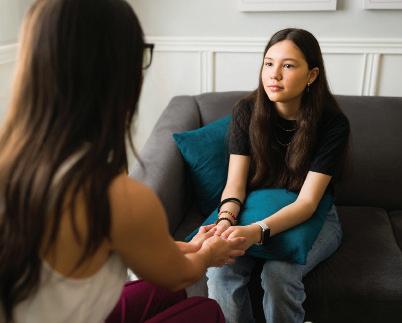
Comprehensive Healthcare’s Youth Mobile Outreach team consists of peer counselors who have lived experience – a youth partner who accessed behavioral health services in their youth, and a family partner who had children with lived experience in behavioral health – both supervised by mental health professionals and supported by care coordinators. The team seeks to support both the youth and the family in navigating the crisis and establishing connections to the ongoing supports they need.
The program launched in Benton and Franklin counties in December 2022, and within its first six months, served 317 individuals and families with 1,788 services. Early intervention is effective; typically, youth in crisis don’t need hospital care but do need immediate assistance and intensive support to manage the crisis event.
Hesla emphasized that giving youth and families an opportunity to engage with peers helps to destigmatize behavioral health needs on an ongoing basis.
“When young people connect with positive-thinking peers who have lived experience and shared struggles, it helps motivate them to engage in care,” Hesla said. “That begins with our Youth Mobile Outreach Team and may continue in other treatment settings like group therapy, which helps participants develop their social skills, problem-solve during challenges, and learn coping skills to manage their needs.”
FALL 2023 7
We get calls all the time from families who are grateful to our team for helping see their children through their crisis and wanting to stay connected with us.
Embracing the Convenience of Telehealth Appointments
Our team aims to make care convenient and accessible in many ways – including through telehealth, where we see clients virtually on their computers or mobile devices through audio/video appointments. Comprehensive Healthcare uses the Webex software, with HIPPA-compliant security, to deliver mental health and substance use disorder therapy appointments to our vibrant communities. Using this software as a service solution, providers and clinicians are also able to ensure immediate connection with those in crisis, allowing for quicker triage to meet the immediate need(s).
We can host a telehealth encounter by scheduling Webex appointments wherever our clients may be, including the client’s home, work, car, or school, and even in correctional facilities, in addition to most hospital Emergency Rooms (ERs) across our service areas. To support clients and care teams in jails and ERs, telehealth allows us to instantly connect with medical providers, correctional staff, and clients in times of crisis to help determine if a designated crisis responder is needed immediately.
Research shows that care delivered virtually can be just as effective as in-person treatment. Plus, virtual services help to reduce missed appointments, because it’s easy, timely and convenient for clients to meet with their care team. In fact, if a client can’t make it to their in-person appointment, our provider can call them and share a Webex link to connect virtually, which helps everyone adhere to a consistent treatment plan.
Telehealth is especially impactful in rural areas, helping clients avoid long trips to physical locations and making a range of services available to communities where we might
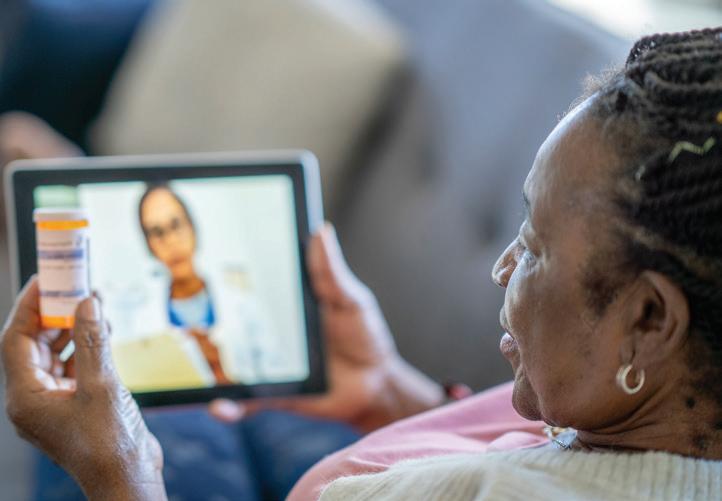
not have a clinic. For example, in Klickitat County we’re currently serving 120 clients through telehealth which helps provide much needed behavioral health care to community members who need it. While some may be unfamiliar with Webex, our information services (IS) team is always available to help with new technology and technical issues. And realizing that not everyone has reliable internet access at home, we’ve equipped some of our Comprehensive Healthcare locations with private client rooms, comfortable seating and internet access for the telehealth technological connection, which helps provide equitable access for our clients. We can also treat our clients virtually from anywhere that offers free and reliable Wi-Fi access such as public libraries with private rooms, in the client’s car outside of McDonalds or Starbucks, school districts, or any public access point. We have even worked with community partners to help clients with getting a temporary private room for their telehealth appointment within a local hospital.
If you’re new to Webex telehealth appointments, step-by-step instructions are provided for assistance. You’ll find that it’s easy to use, here’s how:
We’ll ask you if you prefer in-person or telehealth.
Support services will send you a calendar invite with an embedded link.
1 2 3 4 OR
At your appointment time, just click the link in the invite to join your appointment.
If you’re an existing client, simply call in to schedule an appointment. Vibrant Communities 8
FAQs About Group Therapy:
One of our favorite creative solutions in behavioral healthcare is group therapy. Not only does group therapy offer comparable outcomes to individual therapy, but it also helps to connect people. Those going through similar challenges can share stories and learn from each other in a supportive environment, which is an important part of a person’s pathway towards overall wellness. Here are some frequently asked questions about Comprehensive Healthcare’s group therapy.
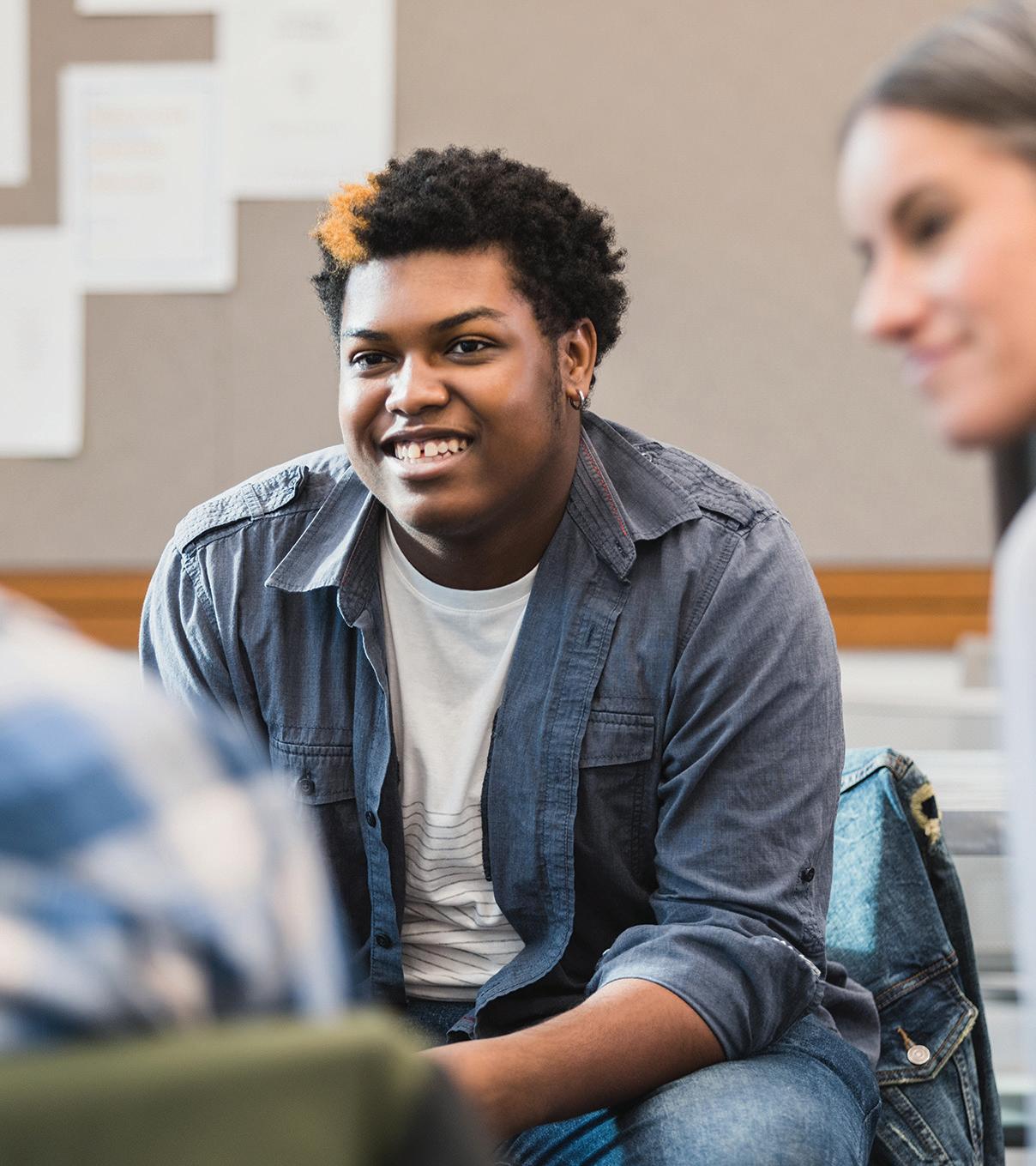
What is group therapy?
Group therapy is one way to get our clients into an effective form of treatment in a timely manner. Groups are made up of 5-12 people from all walks of life and led by a behavioral health professional. Groups focus on many different areas of behavioral health, such as depression, emotion regulation, peer socializing, and substance use disorder outpatient treatment. Our groups meet virtually or in person for one hour to two hours from two to four months depending on the treatment focus in our service areas, including Yakima, Walla Walla, Kittitas, Sunnyside, and Pasco. Many clients feel once group therapy has concluded they have met their treatment goals.
What are the benefits of group therapy?
Groups help clients find and experience a safe space where they can learn more about themself and express their own voice. Groups help people gain knowledge from their peers – while promoting social skills. Ron Gengler, Comprehensive clinical vice president says, “The groups offered at Comprehensive Healthcare are good enough for my grandkids, and I would tell each of them to ask if there is a group treatment available if they ever seek counseling services.”
g helps you realize you’re not alone.
g facilitates giving and receiving support.
g helps you find your “voice.”
g helps you relate to others (and yourself in healthier ways.
g provides a safety net.
When is group therapy a better option than individual therapy?
We suggest group therapy as a client’s best option when they would benefit from the outcomes listed above, or if individual therapy is not available or timely.
According to an article from the American Psychological Association, “In many cases, groups can be even more effective than individual therapy, thanks to the stigma reduction and solidarity that people experience in the presence of their peers.”
How can a client get comfortable sharing with others?
Our Comprehensive Healthcare group therapists help group members establish trust with one another, support those who are sharing and remind group members to listen non-judgmentally and to respect each other’s privacy – what is said in the group stays in the group. Feeling safe in group therapy is important to a successful group experience. Over time group members learn to be supportive, which is part of learning to use skills from the group towards recovery and resiliency. With time and learning to develop safe healthy relationships with other group members, people become more comfortable sharing and connecting. Many group members create long-term supportive relationships.
How do clients sign up for group therapy?
After a client has completed the initial assessment, the Comprehensive Healthcare therapist will recommend treatment options which may include a group.
We hope this helps you feel more open to group therapy – a creative solution in behavioral health – and that you’ll enjoy all the benefits of connecting with others! You can view our current list of groups on the Comprehensive Healthcare website.
According to Margarita Tartakovsky, M.S., from 5 Benefits of Group Therapy:
5 1 2 3 4 5
FALL 2023 9
Group therapy
Comprehensive Healthcare: Now hiring for positions that help community members
If you want to help people improve their lives, we have jobs for you!
We value our team members with competitive benefits including tuition reimbursement, holiday pay and student loan forgiveness. Our employees are team-minded, creative and compassionate individuals who enjoy being challenged and continually strive for excellence. We have a variety of openings from clinical and medical providers, to care coordinators, crisis outreach experts, and beyond. Read on to learn about job openings.
Yakima, WA
Our Director of Inpatient Services is responsible for all fiscal, administrative, clinical, and operational aspects of our evaluation and treatment services throughout the Yakima Campus. This includes both youth and adult treatment facilities. The director will oversee staff and provide clinical supervision, develop and monitor the evaluation and treatment services budget, and ensure that services provided are effective and accessible.
Yakima, WA
Now offering $15,000 hiring bonus to all full-time nurses! Nurses collaborate with various treatment teams to provide integrated, evidence-based treatment to clients. Nurses work closely with clients to administer medications, to provide education about prescriptions and general health needs, and to develop a treatment plan that reflects the clients’ goals.
Yakima, Ellensburg, and Walla Walla, WA
Case Managers work within various teams at Comprehensive to provide support and coordination of care to our outpatient clients. Recognizing the complex needs beyond mental health and substance use treatment, Case Managers work with clients to build skills necessary for independent living, self-advocacy, treatment engagement, and social participation.
CLINICAL SUPERVISOR
Yakima, WA
Now offering a hiring bonus of $7,500 depending on license and degree! Supervisors for our outpatient programs are responsible for both providing mental health therapy to clients and managing the outpatient services team. The Supervisor utilizes evidence-based practices to provide clients and their families with support in learning new skills and connecting to community resources.
PROJECT DIRECTOR
Pasco and Walla Walla, WA
The Project Director is responsible for carrying out the requirements of our newest project, a grant for the Enhancement and Expansion of Treatment and Recovery Services for Adolescents, Transitional Aged Youth, and their Families – better known as the Youth and Family Tree Grant. This grant allows us to serve teens and young adults aged 12-25 years old who have substance use disorders or co-occurring substance use and mental health concerns. Our focus will be on improving and expanding early intervention, comprehensive treatment, and recovery support services for youth and their families or primary caregivers in Walla Walla, Benton, and Franklin Counties.
Why Work for Us
• Bonuses for eligible staff
• Tuition Reimbursement Program
• Student Loan Repayment Assistance
• Employee Assistance Plan
• Online, text-based primary health care – 98point6
• Legal Service Plan
• Funded team-building activities
For employment opportunities with Comprehensive Healthcare visit https://comphc.org/ employment/ or contact Megan Peters, Recruitment Specialist, (509) 576-4337, megan.peters@comphc.org
NURSERN OR LPN
DIRECTOR OF INPATIENT SERVICES
CASE MANAGER
Vibrant Communities 10
SUNNYSIDE NATIONAL NIGHT OUT
City staff organized a community gathering to celebrate Sunnyside and showcase the various services offered to families in a fun-filled setting.
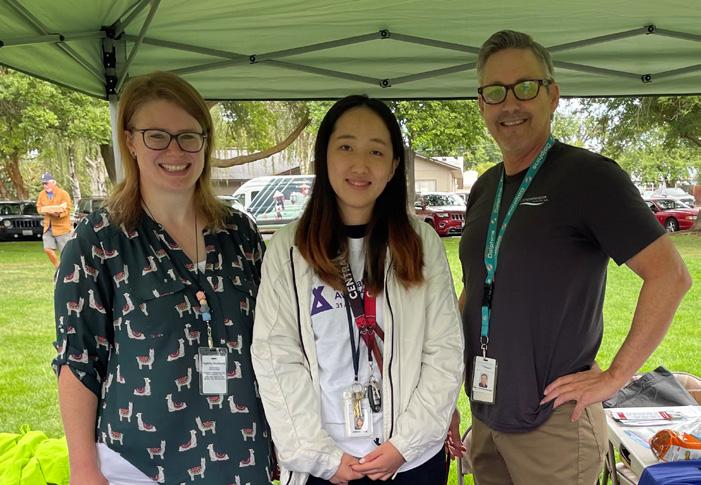
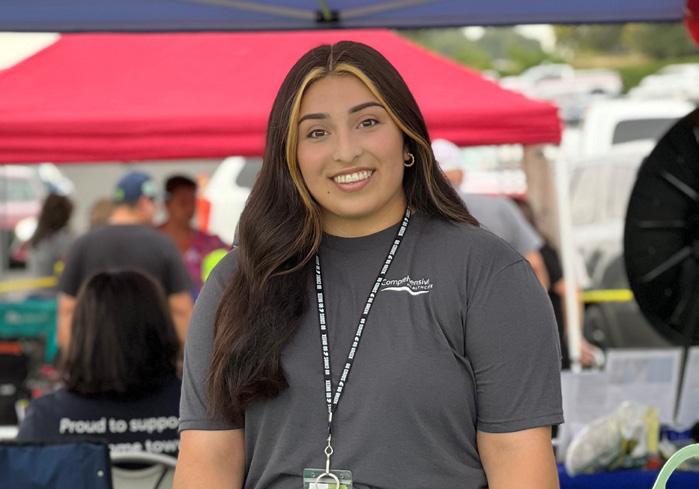
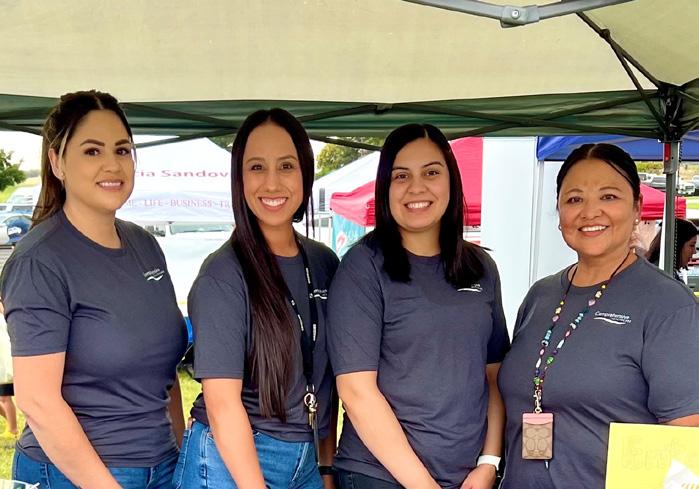
NAMI PATHWAYS TO HOPE CONFERENCE
On August 25-26, Comprehensive Healthcare attended the NAMI Pathways to Hope Conference in Yakima. The event saw two of our team members, Diego Mendoza and Kristylynne Goveia, take the stage as speakers in various breakout sessions on mental health, counseling, and youth mental health resources. Pictured here is Kristylynne Goveia, giving a presentation on mental health to a group of attendees.
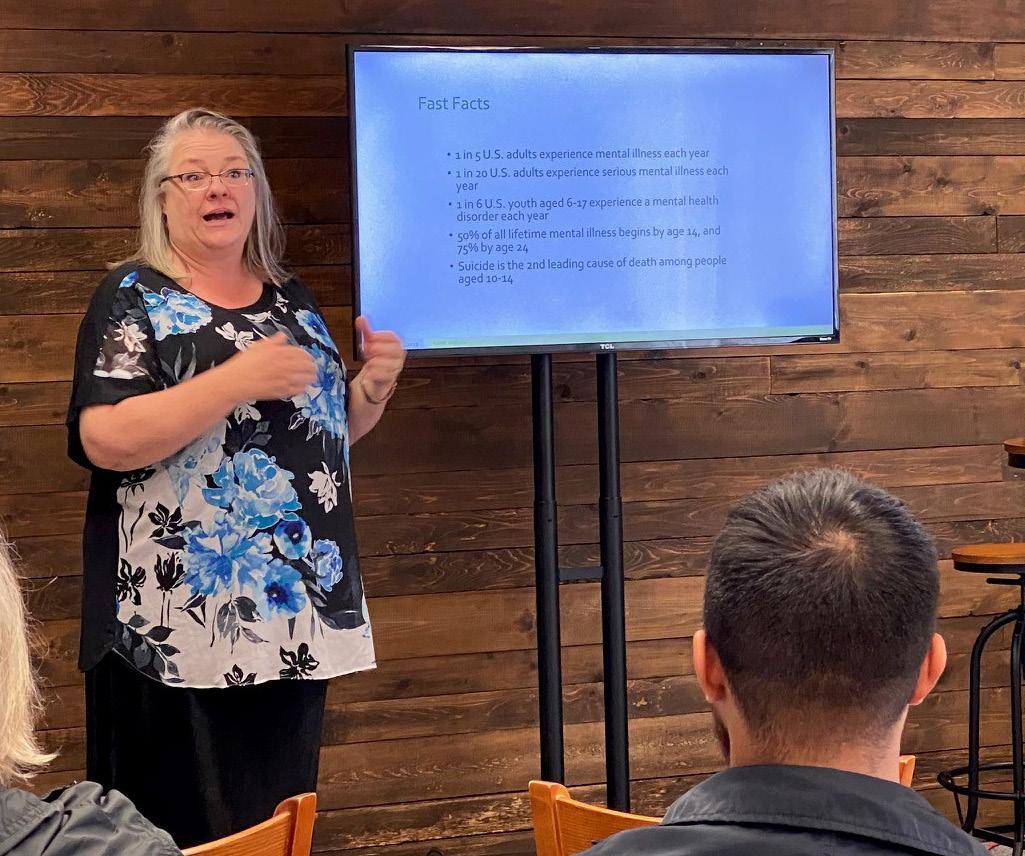
OVERDOSE AWARENESS DAY
See Us in the Community
On August 31st, communities across the US and worldwide came together to observe Overdose Awareness Day, dedicated to raising awareness about the devastating impact of drug overdoses and remembering those who have lost their lives to this epidemic. Comprehensive Healthcare hosted booths at three events in Yakima, Ellensburg, and Walla Walla.
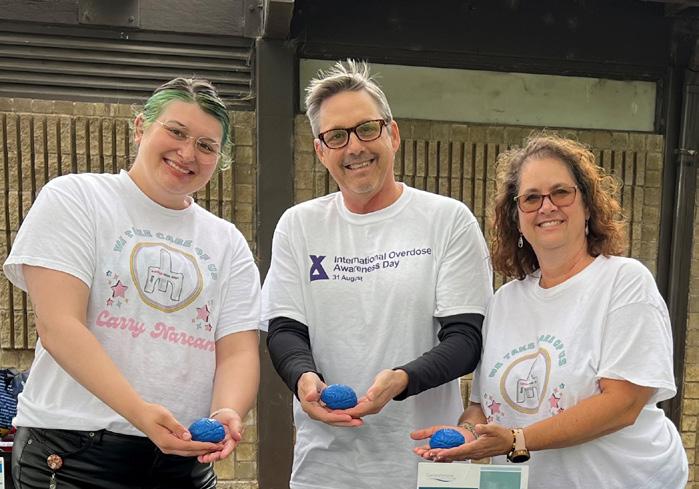 Sintia from Aspen provided valuable information on Victim Advocacy Services to the community.
Claudia Bonilla, Daisy Luna, Julietta Romero, and Matilde Reyes (pictured above, left to right), who are part of our outpatient staff in Sunnyside, showcased Comprehensive Healthcare’s efficient same-day access and emphasized the various services offered at Sunnyside National Night Out.
Pictured above, left to right, are Arianna Rhodes, Jaeeun Kang, and Marc Shellenberger at the Ellensburg event.
Pictured above, left to right, are Emily Bush, Marc Shellenberger, and Francie Pfeiffer at the Yakima event.
Sintia from Aspen provided valuable information on Victim Advocacy Services to the community.
Claudia Bonilla, Daisy Luna, Julietta Romero, and Matilde Reyes (pictured above, left to right), who are part of our outpatient staff in Sunnyside, showcased Comprehensive Healthcare’s efficient same-day access and emphasized the various services offered at Sunnyside National Night Out.
Pictured above, left to right, are Arianna Rhodes, Jaeeun Kang, and Marc Shellenberger at the Ellensburg event.
Pictured above, left to right, are Emily Bush, Marc Shellenberger, and Francie Pfeiffer at the Yakima event.
FALL 2023 11
Yakima Center
402 S. 4th Avenue
P.O. Box 959
Yakima, WA 98907
(509) 575-4084
comphc.org
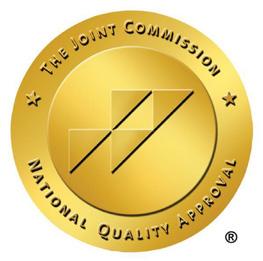


Ellensburg Center
707 N. Pearl Street
Ellensburg, WA 98926
(509) 925-9861
Cle Elum Center
402 1st Street
Cle Elum, WA 98922
(509) 674-2340
Sunnyside Center
1319 Saul Road
Sunnyside, WA 98944
(509) 837-2089
Pasco Center
2715 Saint Andrews Loop, Suite C
Pasco, WA 99301
(509) 412-1051
Goldendale Center
112 W. Main Street
Goldendale, WA 98620
(509) 773-5801
Walla Walla Center
1520 Kelly Place, Suite 234
Walla Walla, WA 99362
(509) 524-2920
White Salmon Center
432 N.E. Tohomish Street
White Salmon, WA 98672
(509) 493-3400
Kennewick Center
7404 West Hood Place
Kennewick, WA 99336-6718
(509) 792-1747
While September is Suicide Awareness Month, we can learn how to talk about and prevent suicides every month of the year. Did you know that talking about suicide doesn’t make it happen? In fact, asking questions of loved ones is a great way to encourage them to open up about thoughts of suicide so that you can offer help. Comprehensive Healthcare’s community education classes offer suicide prevention training with options like Mental Health First Aid, SAFE: Suicide Awareness for Everyone, and LEARN® training for staff and faculty in higher education settings. Visit https://comphc.org/services/community-education/ to learn more.
Vibrant Communities © 2023 is published by Comprehensive Healthcare Jodi Daly, Ph.D., President/Chief Executive Officer Call (509) 575-4084 with comments or suggestions, or visit our website at www.comphc.org to learn more about the services offered by Comprehensive Healthcare. NON PROFIT ORG. U.S. Postage PAID Permit No. 90 Yakima, WA
The LEARN® steps are: Read the digital magazine L Look for Warning Signs Empathize and Listen Ask Directly about Suicide Remove the Danger Next Steps E A R N



 Jodi Daly, Ph.D. President and CEO, Comprehensive Healthcare Member of Fourfront Contributor
Jodi Daly, Ph.D. President and CEO, Comprehensive Healthcare Member of Fourfront Contributor











 Sintia from Aspen provided valuable information on Victim Advocacy Services to the community.
Claudia Bonilla, Daisy Luna, Julietta Romero, and Matilde Reyes (pictured above, left to right), who are part of our outpatient staff in Sunnyside, showcased Comprehensive Healthcare’s efficient same-day access and emphasized the various services offered at Sunnyside National Night Out.
Pictured above, left to right, are Arianna Rhodes, Jaeeun Kang, and Marc Shellenberger at the Ellensburg event.
Pictured above, left to right, are Emily Bush, Marc Shellenberger, and Francie Pfeiffer at the Yakima event.
Sintia from Aspen provided valuable information on Victim Advocacy Services to the community.
Claudia Bonilla, Daisy Luna, Julietta Romero, and Matilde Reyes (pictured above, left to right), who are part of our outpatient staff in Sunnyside, showcased Comprehensive Healthcare’s efficient same-day access and emphasized the various services offered at Sunnyside National Night Out.
Pictured above, left to right, are Arianna Rhodes, Jaeeun Kang, and Marc Shellenberger at the Ellensburg event.
Pictured above, left to right, are Emily Bush, Marc Shellenberger, and Francie Pfeiffer at the Yakima event.


